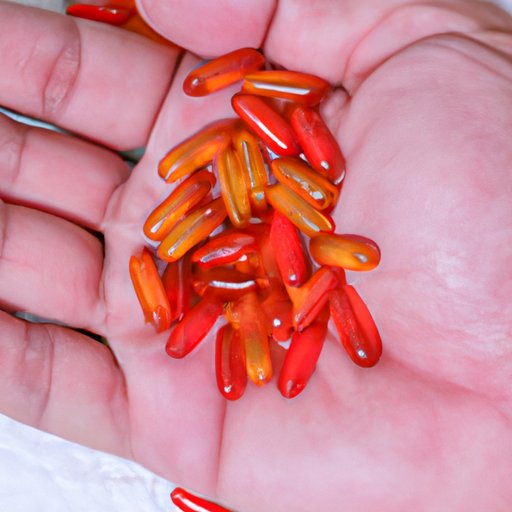I. Introduction
Do you frequently experience tingling in your hands and feet? If so, you’re not alone. Many people experience this sensation, which can range from mild to severe and can occur sporadically or constantly. While it may not always be indicative of a more significant problem, it’s still essential to identify the underlying cause of tingling.
In this article, we’ll explore the top 5 vitamin deficiencies that may result in tingling hands and feet, the link between vitamin deficiencies and nerve function, why tingling in hands and feet could be a sign of a vitamin deficiency, the role of vitamins in nerve function, how vitamin supplements can help, and how to prevent tingling with a balanced diet.
II. Top 5 Vitamin Deficiencies That May Result in Tingling Hands and Feet
While many vitamins are vital for overall health, some are commonly associated with tingling hands and feet. Below are the top 5 vitamin deficiencies linked to tingling:
Vitamin B12
Vitamin B12 is a crucial vitamin needed for healthy nerve function. A deficiency in this vitamin can cause various neurologic and psychiatric symptoms, including tingling in the hands and feet.
Vitamin D
Vitamin D plays a critical role in the body’s absorption of calcium, promoting healthy bone growth and nerve function. A deficiency in vitamin D can cause muscle weakness and numbness or tingling in the hands and feet.
Vitamin B6
Vitamin B6 is necessary for producing neurotransmitters that transfer messages between nerve cells. A deficiency can cause peripheral neuropathy, which includes tingling, burning, and other sensations in the hands and feet.
Vitamin E
Vitamin E is another vitamin that can support healthy nerve function. A deficiency can cause sensory impairment, including tingling in the hands and feet.
Vitamin B1
Vitamin B1, also known as thiamine, is crucial for proper nerve function. A deficiency can cause numbness and tingling in the hands and feet, as well as general muscle weakness.
III. The Link Between Vitamin Deficiencies and Tingling in Hands and Feet
Studies support the link between vitamin deficiencies and tingling in hands and feet. The body’s nerves rely on vitamins to work correctly, and a deficiency can cause nerve damage, resulting in tingling sensations.
For example, vitamin B12 deficiency can lead to the destruction of myelin, a component that serves as a protective cover for nerves. As a result, nerves may become damaged, causing symptoms such as numbness and tingling in the hands and feet.
IV. Why Tingling in Hands and Feet Could Be a Sign of Vitamin Deficiencies
Tingling in hands and feet can be a symptom of more significant problems, including vitamin deficiencies. If you experience tingling sensations on a frequent basis, it’s essential to identify the underlying cause and seek treatment accordingly.
Other symptoms that may accompany tingling due to a vitamin deficiency include fatigue, weakness, difficulty walking, memory loss, confusion, and depression.

V. The Role of Vitamins in Nerve Function and Tingling Hands and Feet
Vitamins play a crucial role in nerve health, supporting the production of neurotransmitters, which transfer messages between nerve cells. Each of the five vitamins mentioned above contributes uniquely to nerve function.
Vitamin B12
Vitamin B12 supports the production of myelin, a protective layer that surrounds nerve fibers. It also aids in the formation of red blood cells, which carry oxygen throughout the body.
Vitamin D
Vitamin D promotes the body’s absorption of calcium, which is crucial for bone growth and nerve function.
Vitamin B6
Vitamin B6 is necessary for the production of neurotransmitters, which transmit messages between nerve cells. It also regulates the body’s internal clock and supports the immune system.
Vitamin E
Vitamin E is an antioxidant that can help protect nerves from damage and supports the immune system.
Vitamin B1
Vitamin B1, or thiamine, is vital for carbohydrate metabolism and promoting healthy nerve function.
VI. Tackling Tingling in Hands and Feet: How Vitamin Supplements Can Help
If you experience tingling in your hands and feet due to a vitamin deficiency, vitamin supplements can help alleviate your symptoms. Supplements provide your body with essential vitamins that it may be lacking, helping to regulate nerve function and improve overall health.
For example, vitamin B12 injections can provide quick relief for those with a deficiency. Vitamin D supplements may also help those with a deficiency. However, it’s essential to speak with your doctor first before taking any supplements.
VII. Preventing Tingling Hands and Feet With a Balanced Diet Rich in Essential Vitamins
While supplements can help alleviate tingling symptoms, it’s crucial to maintain a balanced diet rich in essential vitamins to prevent deficiencies from arising in the first place. Below are some foods that are high in the vitamins necessary for nerve health:
- Vitamin B12 – shellfish, liver, fish, meat, and dairy products
- Vitamin D – fatty fish, beef liver, egg yolks, and fortified foods such as milk and orange juice
- Vitamin B6 – chickpeas, tuna, fortified cereals, and salmon
- Vitamin E – almonds, sunflower seeds, peanut butter, and spinach
- Vitamin B1 – peas, fortified cereals, nuts, and pork
By incorporating these foods into your diet, you can ensure that your body is getting the vitamins necessary for healthy nerve function.
VIII. Conclusion
Overall, tingling in hands and feet can be an uncomfortable and concerning sensation. Supplemented by a balanced diet, understanding the link between vitamin deficiencies and nerve function, and recognizing the signs of a vitamin deficiency, such as fatigue, weakness, difficulty walking, memory loss, confusion, and depression, are essential steps in addressing this problem. Always speak to your doctor if you’re experiencing tingling sensations frequently; they can help identify any underlying conditions, including vitamin deficiencies, and suggest a course of treatment.
